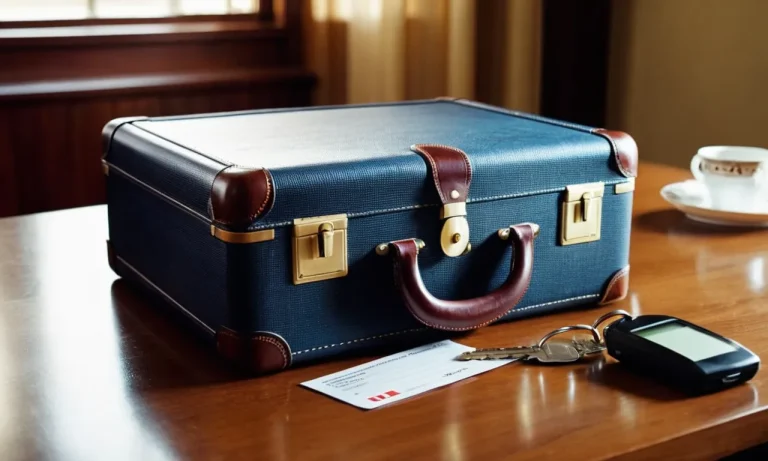How Old Do You Need to Be to Get a Hotel Room in California?
Traveling to California and planning to stay in a hotel? If you’re under 18, you might be wondering if you can book a hotel room on your own. The legal age requirements for renting a hotel room in California can be confusing, especially for young travelers.
If you’re short on time, here’s a quick answer to your question: In California, the minimum age to rent a hotel room is typically 18 years old. However, some hotels may have their own policies and allow guests as young as 16 or 17 to check in with parental consent or a credit card in their name.
In this comprehensive guide, we’ll explore the legal age requirements for renting a hotel room in California, exceptions to the rules, and tips for young travelers. We’ll also cover the potential consequences of violating hotel policies and provide insights into the reasoning behind these age restrictions.
Legal Age Requirements for Renting a Hotel Room in California
When planning a trip to the Golden State, one crucial consideration is whether you meet the legal age requirements for renting a hotel room. California’s laws and hotel policies can vary, so it’s essential to understand the rules before booking your stay.
In this article, we’ll explore the legal age requirements for renting a hotel room in California, covering state laws, hotel chain policies, and independent hotel guidelines.

California State Laws
California State law does not specify a minimum age for renting a hotel room. However, many hotels have implemented their own policies to comply with liability concerns and prevent potential issues.
It’s crucial to remember that while California law may not dictate a specific age limit, individual hotels can still enforce their own age requirements.
Hotel Chain Policies
Major hotel chains often have standardized policies regarding the minimum age for renting a room. Here are some examples:
- Marriott: Guests must be at least 18 years old to reserve a room, according to their help page.
- Hilton: Generally, the minimum age to book a room is 18 years old, although it may vary per location.
- Hyatt: According to their policies, generally, guests must be at least 21 years old to check into a Hyatt hotel.
It’s worth noting that these policies may vary slightly depending on the hotel’s location and specific circumstances. It’s always advisable to check with the hotel directly before making a reservation to ensure you meet their age requirements.
Independent Hotel Policies
Independent hotels and smaller chains often have their own unique policies regarding the minimum age for renting a room. These policies can vary widely, with some hotels allowing guests as young as 16 or 17 to check in, while others may require guests to be 21 or older. 😊
Some online reports noted that some independent hotels in the Palm Springs area allow guests as young as 18 to book a room, while others require guests to be at least 21 years old.
To avoid any surprises or disappointments, it’s always best to contact the independent hotel directly and inquire about their specific age requirements before making a reservation. This way, you can ensure a smooth and hassle-free stay in California.
| Hotel Chain | Minimum Age |
|---|---|
| Marriott | 18 years |
| Hilton | 18 years |
| Hyatt | 21 years |
| Independent Hotels | Varies, typically 16-21 years |
Remember, these age requirements are in place for valid reasons, such as liability concerns and ensuring a safe and enjoyable experience for all guests. By being aware of the rules and policies, you can plan your California adventure with confidence and peace of mind. Happy travels! 🎉
Exceptions to the Age Requirements
While the general rule in California is that you must be 18 years old to check into a hotel room, there are a few exceptions that allow minors to do so under certain circumstances. These exceptions are designed to accommodate different situations and provide flexibility for travelers who may not meet the standard age requirement.
Parental Consent
One of the most common exceptions to the age requirement is when a minor has parental consent to check into a hotel room. Many hotels in California will allow minors to book a room if they have a signed letter or consent form from their parent or legal guardian.
This letter should typically include the parent’s contact information, the dates of the minor’s stay, and an explicit statement authorizing the minor to check into the hotel.
It’s important to note that hotel policies regarding parental consent can vary, so it’s always a good idea to contact the specific hotel in advance to understand their specific requirements.
Some hotels may require the parent or guardian to be present during check-in or to provide a credit card for incidentals. Others may have additional restrictions or guidelines in place.
Credit Card in Minor’s Name
Another exception to the age requirement is when a minor has a credit card in their own name. In some cases, hotels may allow minors to check in if they can provide a valid credit card in their name as a form of payment and identification. However, this exception can be subject to certain limitations or restrictions imposed by the hotel or credit card company.
According to Forbes.com, some credit card issuers allow minors to obtain a credit card, typically with a parent or guardian as a co-signer or joint account holder. This can provide minors with a way to establish credit history and gain financial independence, while also allowing them to book hotel rooms in certain situations.
Military Personnel
Minors who are members of the military may also be exempt from the age requirement for checking into hotels in California. Many hotels recognize the unique circumstances of military personnel and may allow minors who are actively serving to book rooms without parental consent or additional documentation.
This exception is often extended to minors who are in the process of reporting for duty or are on leave from their military assignments. It’s always a good idea for military personnel to carry their valid military ID and any relevant orders or documentation to facilitate the check-in process.
It’s worth noting that while these exceptions exist, hotels in California still have the right to enforce their own policies and may choose to deny accommodations to minors, even if they fall under one of these categories.
It’s always advisable to contact the hotel in advance to understand their specific policies and requirements regarding minors checking into hotel rooms. 😊

Consequences of Violating Hotel Age Policies
While it may seem tempting to try and circumvent the age requirements for booking a hotel room, doing so can have serious consequences. Hotels have these policies in place for good reason, and violating them can result in denial of service, potential legal implications, and damage to your reputation.
Let’s explore each of these consequences in more detail.
Denial of Service
If a hotel discovers that you have provided false information or misrepresented your age during the booking process, they have every right to deny you service and refuse to let you check in.
This can be incredibly frustrating, especially if you’ve already traveled to the hotel and have no other accommodation lined up.
Potential Legal Implications
In some cases, attempting to book a hotel room while underage can be considered fraud or misrepresentation, which can have legal consequences. Hotels may choose to involve law enforcement, especially if the underage guest engages in illegal activities like underage drinking or drug use on the premises.
Underage drinking is a widespread issue, with around 24.6% of people aged 12-20 reporting alcohol consumption in the past month. Hotels have a responsibility to prevent such activities, which is why they take age policies seriously.
Damage to Reputation
Even if you manage to successfully book a hotel room while underage, there’s always the risk of damaging your reputation. Hotels may blacklist you or share your information with other establishments, making it difficult for you to book accommodations in the future.
Additionally, if your violation becomes public knowledge, it could harm your personal or professional reputation. In today’s digital age, where information spreads quickly, a single mistake can have lasting consequences.
Don’t underestimate the power of online reviews and social media when it comes to tarnishing your reputation. Many consumers say an online review has convinced them to avoid a business.
So, while it might seem like a harmless prank or a way to save money, violating hotel age policies can have serious consequences that are simply not worth the risk.
It’s always better to play by the rules and book accommodations that align with your age and the hotel’s policies. After all, a little patience and planning can go a long way in ensuring a safe, enjoyable, and hassle-free stay.
Reasons Behind Age Restrictions for Hotel Guests
Liability Concerns
Hotels have a legal obligation to ensure the safety and well-being of their guests, and this includes mitigating potential risks associated with underage guests. By enforcing age restrictions, hotels can reduce their liability in the event of any incidents or accidents involving minors.
Hotels face an increased risk of lawsuits and legal consequences when minors are involved in activities such as underage drinking, drug use, or other illicit behaviors on their premises.
Preventing Underage Drinking and Parties
One of the primary concerns for hotels is the potential for underage guests to engage in illegal activities, such as underage drinking or hosting parties. By setting a minimum age requirement, hotels can better control and monitor the behavior of their guests, reducing the likelihood of such incidents occurring.
Many college students admitted to engaging in binge drinking while staying in hotels, highlighting the importance of age restrictions in preventing such behaviors.

Ensuring Guest Safety
Age restrictions also play a crucial role in ensuring the overall safety and well-being of all hotel guests. Minors may lack the maturity and experience to handle emergency situations or follow hotel policies and procedures.
By setting a minimum age requirement, hotels can ensure that their guests have the necessary level of responsibility and awareness to maintain a safe and secure environment for everyone. A significant number of hotel-related injuries involve minors, further emphasizing the importance of age restrictions in promoting guest safety.
While the specific age requirements for hotel guests may vary across different states and hotel chains, the underlying reasons behind these restrictions remain consistent. By prioritizing liability concerns, preventing underage drinking and parties, and ensuring guest safety, hotels can create a more secure and enjoyable experience for all their guests, regardless of age.
Tips for Young Travelers Booking Hotel Rooms in California
Research Hotel Policies
Before booking a hotel room in California, it’s crucial to research the specific policies of the hotel you’re interested in. Many hotels have age restrictions that vary from property to property.
According to Kayak.com, the legal age to rent a hotel room in most states is typically 18. However, some hotels may require guests to be 21 or older. It’s always best to check the hotel’s website or contact them directly to inquire about their age policies.
Additionally, some hotels may have different policies for unaccompanied minors or require a parent or legal guardian to be present during check-in. Being informed about these policies can help you avoid any surprises or potential issues when trying to book a hotel room as a young traveler.
Obtain Parental Consent
If you’re under the legal age to rent a hotel room, you may need to obtain parental consent. Many hotels require a parent or legal guardian to provide written authorization or be present during check-in if the guest is a minor. This is a common practice to ensure the safety and well-being of young travelers.
Some hotels may also require a credit card in the parent’s name or a refundable security deposit to cover any potential damages or incidentals. It’s important to communicate with the hotel in advance and have the necessary documentation or arrangements in place to ensure a smooth check-in process.
Consider Alternative Accommodations
If you’re having difficulties finding a hotel that accommodates your age or if the policies seem too restrictive, consider exploring alternative accommodations. Vacation rentals, such as Airbnb or VRBO, may offer more flexibility for younger travelers. These platforms often allow individuals of various ages to book accommodations, although it’s still essential to review the specific host’s policies.
Another option could be hostels, which cater to a younger demographic and may have more relaxed age requirements. However, it’s crucial to research the safety and reputation of the hostel before booking.
By keeping an open mind and exploring different accommodation options, you can increase your chances of finding a suitable and affordable place to stay during your travels in California.
Remember, as a young traveler, it’s essential to prioritize your safety and follow the rules and regulations set by the accommodation providers. With proper planning and research, you can have an enjoyable and memorable trip to California.
Conclusion
Navigating the legal age requirements for renting a hotel room in California can be challenging for young travelers. While the general rule is that guests must be at least 18 years old, exceptions and variations exist based on hotel policies and specific circumstances.
By understanding the laws, potential consequences, and reasoning behind age restrictions, young travelers can make informed decisions and plan their accommodations accordingly. Whether it’s obtaining parental consent, using a credit card in their name, or exploring alternative options like vacation rentals, being proactive and prepared can help ensure a smooth and enjoyable stay in California.
Remember, age policies are in place to protect both the hotels and their guests. Respecting these rules not only ensures compliance but also contributes to a safe and responsible travel experience for everyone involved.






